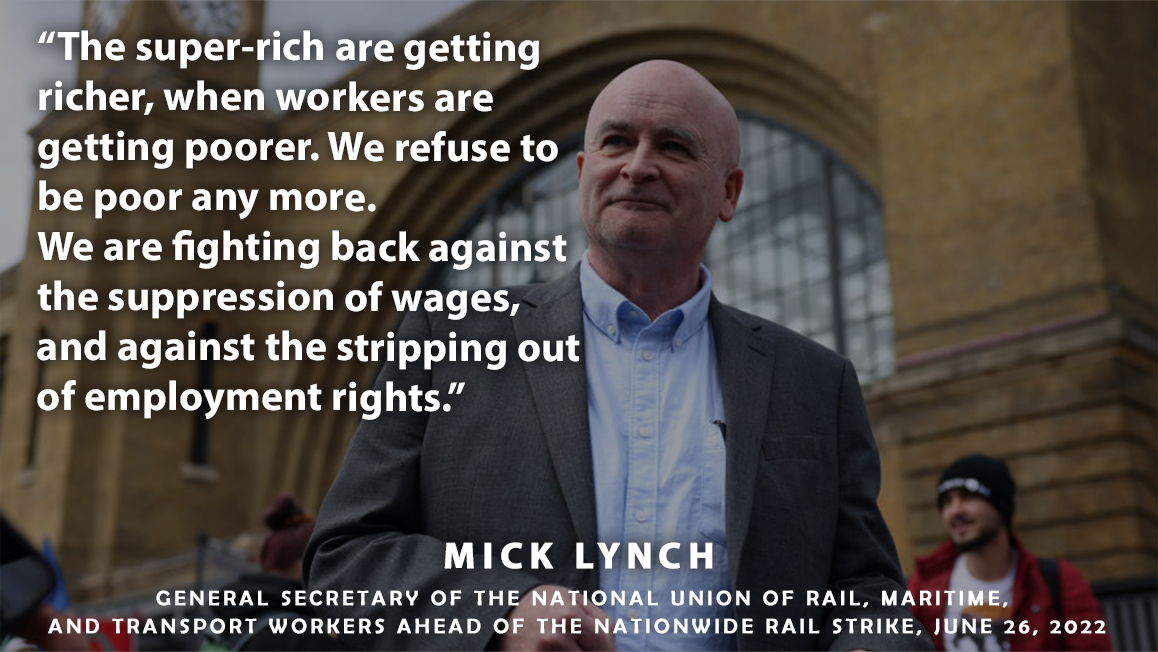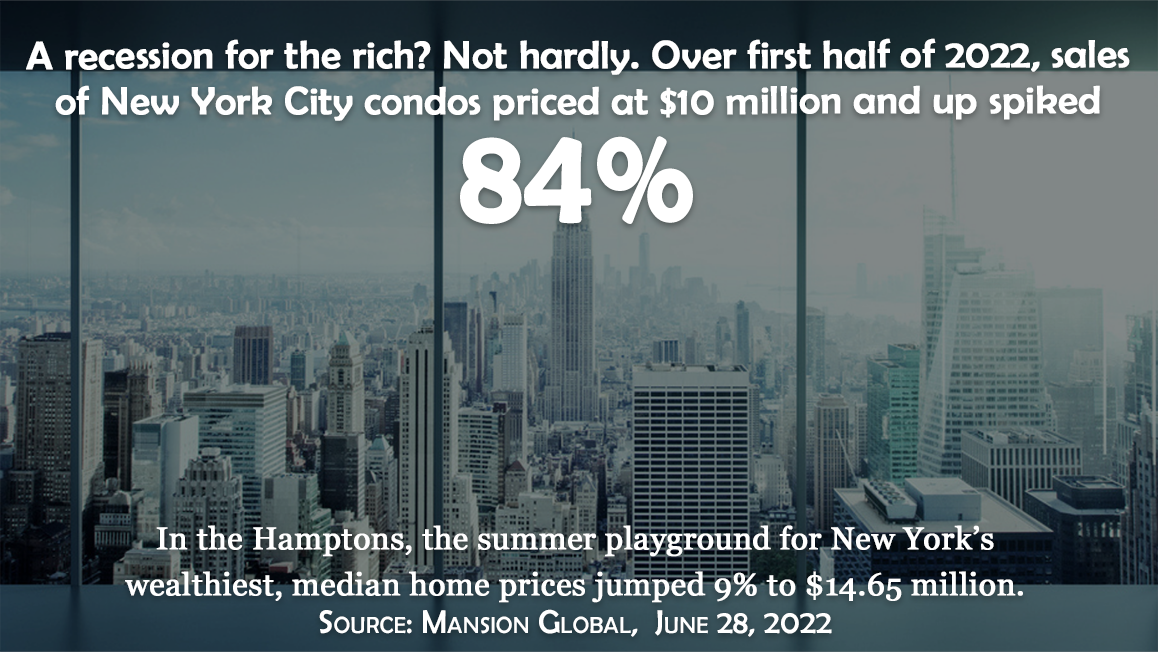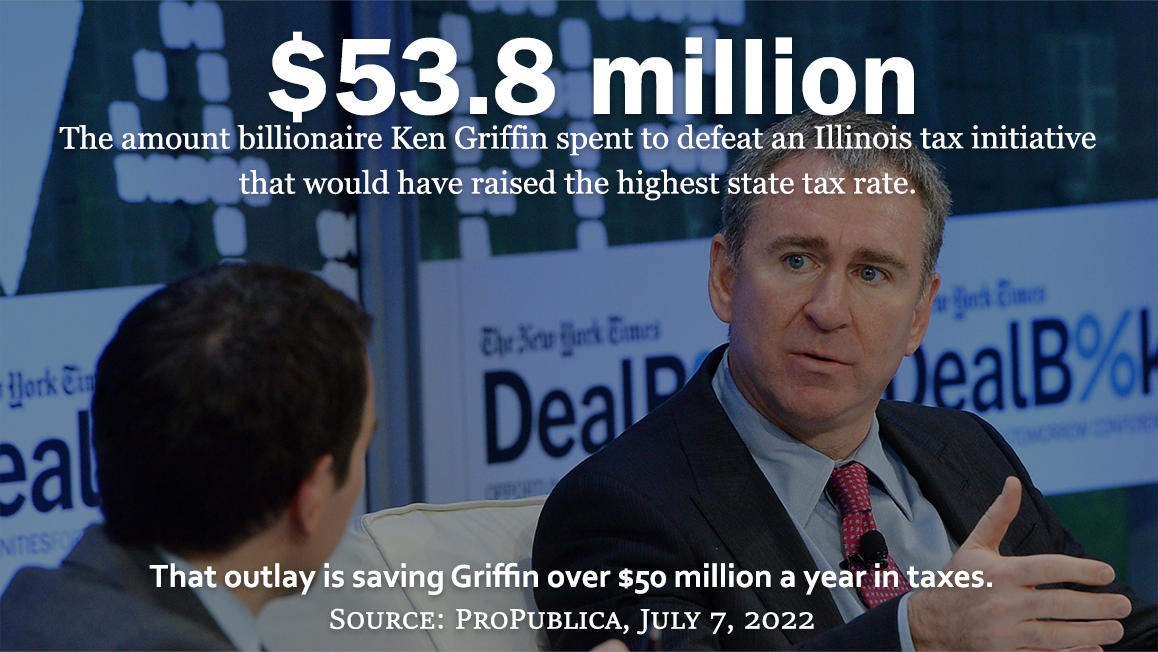| THIS WEEK |
Amazon Prime members this week, says Amazon, will be treated to what the company describes as “two days of epic deals” on July 12 and 13. But just who, we wonder, is really going to get the epic deals “Prime Day” promises?
Surely not the Amazon warehouse and fulfillment center employees tasked with completing 10 hours of unrelenting physical labor with just two 30-minute breaks. Amazon workers have described Prime Day as a workday as busy as any December holiday rush, only with punishing heat.
Jeff Bezos, on the other hand, won’t have to sweat any to profit from Prime Day. Bezos, while no longer Amazon’s CEO, still holds an 11 percent share of the company. Making billions while sitting in boardrooms and megayachts while your workers make $16 per hour slaving away in warehouses — now that rates as the real epic deal!
Economist Richard Wolff is urging us this Prime Day to declare our independence from Amazon. Notes the veteran analyst: “Immense corporations like Amazon need a change.” The grand fortune of Jeff Bezos, he adds, simply “stands in too large a contrast with the difficult economic conditions imposed on his company’s employees.”
We agree! For more on our outrageously rich, stay tuned for new findings coming next week from our Charity Reform Initiative on how our nation’s wealthiest are thoroughly distorting American philanthropy.
Chuck Collins and Rebekah Entralgo,
for the Institute for Policy Studies Inequality.org team
|
|
| |
|
| INEQUALITY BY THE NUMBERS |
 |
|
|
|
| |
|
| FACES ON THE FRONTLINES |
 |
| In 2022, Combating Inequality With Real Pride |
Corporations tend to celebrate Pride Month with rainbow products, parade floats, and fragmented donations to charity (and, on the sly, to homophobic politicians). Their approach isn’t exactly transforming LGBTQ+ workers' lives. For every dollar straight workers earn, LGBTQ+ workers make up to 40 cents less. These workers, particularly transgender women of color, also endure significantly higher poverty rates.
Organizers like Gabrielle Lenart, pictured here second from left, and Radhika Sharma are countering corporate “Pride” with initiatives that emphasize transformative local involvement. Lenart and Sharma are helping lead the Queer Food Foundation, a mutual aid project fighting food insecurity in the Black Queer and Trans community.
“In our work,” Sharma tells Inequality.org, “we’re trying to reject systems of oppression that tell us that we’re supposed to feel or eat a certain way or only give value to certain kinds of foods and people.”
After an embattled June, where Pride celebrants faced hateful physical and political attacks, uplifting LGBTQ+ people has never been more important. Inequality.org Next Leader Tapti Sen has more. |
|
| |
|
| WORDS OF WISDOM |
 |
|
|
|
| |
|
PETULANT PLUTOCRAT
OF THE WEEK |
 |
| Don't Top Execs Also Deserve Some Stress Relief? |
| Between 2006 and 2014, America’s pharmaceutical distributor giants dumped 81 million prescription opioid pills into West Virginia’s Cabell County, the annual equivalent of 94 pills for every county man, woman, and child. Millions of those pills ended up on the black market and fed rampant addictions. But a federal judge last week ruled that AmerisourceBergen and two other major corporate drug distributors were engaging only in “good faith dispensing.” That court finding came despite evidence showing AmerisourceBergen execs, led by senior VP Chris Zimmerman, exchanging song parodies that ridiculed West Virginians as dumb “pillbillies.” Went one lyric Zimmerman circulated, to the tune of The Beverly Hillbillies sitcom theme: “Come and listen to a story about a man named Jed, a poor mountaineer barely kept his habit fed.” On the witness stand, West Virginia’s Herald-Dispatch reported last year, Zimmerman testified that his mocking emails enabled execs “to vent frustration from their tireless work to keep the supply chain safe.” His firm’s executive culture, he added, remains “of the highest caliber.” |
|
| |
|
| BOLD SOLUTIONS |
 |
| How We Can Regulate Crypto for Racial Equity |
The promise of closing the racial wealth gap through cryptocurrency has proved largely empty. Major crypto asset platforms, tokens, and quasi-banks have collapsed, undone by their own hubris. This collapse comes after years of warnings about the risks these unregulated financial assets pose to Black and Brown communities and the economy at large.
A recent Take on Wall Street campaign webinar focused on why regulating cryptocurrency has become a racial justice issue. Experts including economist Darrick Hamilton, AFL-CIO chief economist William Spriggs, and Michele Gilliam of the Action Center on Race and the Economy explained during the session what we can do to prevent crypto from becoming yet another way already rich white people extract wealth from communities of color. |
|
| |
|
| GREED AT A GLANCE |
 |
|
|
|
| |
|
| TOO MUCH |
 |
| Do You Need Luck These Days to Get Really Rich? |
| Do rich people owe their success to luck? The iconic business magazine Fortune has just put the spotlight on a new book with a new take on how much good fortune contributes to grand fortunes. Questions about luck go “straight to the roots of our beliefs about ‘deserved-ness' in society,” note Ash Ali and Hasan Kubba, the authors of this just-published opus, The Unfair Advantage: How You Already Have What It Takes to Succeed. Ali and Kubba at first appear to stand firmly in the luck-really-counts camp. Then the pair suddenly switch gears. Yes, they argue, deep pockets like Warren Buffett, Bill Gates, and Elon Musk have had “unfair advantages” along their way to grand fortune. But “we all have unfair advantages” of one sort or another. Really? Inequality.org’s Sam Pizzigati has more. |
|
|
|
| |
|
| MUST READS |
What's on Inequality.org
Dedrick Asante-Muhammad and Gerardo Sanchez Herrera Moro, Crypto a Risky Bet for Black Americans. We have better ways to close the racial wealth gap while giving a leg up to Americans of every color.
Todd Larsen, The Planetary Cost of Amazon’s Convenience. That Prime membership enriches a company that’s aggressively marketing itself to help major polluters.
Elsewhere on the Web
Bob Lord and Dylan Dusseault, America needs a true wealth tax: Here's our plan to tax the rich — the really, really rich, Salon. Introducing an innovative proposal for a progressive annual tax on extreme wealth that features four tax brackets starting at 1,000 times our median U.S. household wealth.
Sydney P. Freedberg, Nicole Sadek, Brenda Medina, Agustin Armendariz and Karrie Kehoe, How Uber won access to world leaders, deceived investigators and exploited violence against its drivers in battle for global dominance, International Consortium of Investigative Journalists. The ride-hailing giant utilized and manipulated politicians around the globe to ensure their dominance at the expense of the workers.
Tish Harrison Warren, The Culture War That More Christians Should Be Fighting, New York Times. The indifference Christians on the right often show about wealth disparity flies in the face of thousands of years of Christian teachings.
Dennis Kelleher and Dedrick Asante Muhammad, Financial market regulators can do more to tackle racial economic inequality, American Banker. The 1977 Community Reinvestment Act requires banks to serve the needs of low- to moderate-income members of the communities where they do business. But the rate of homeownership among black Americans today stands no greater than the rate when the act became law.
Paul Kiel and Mick Dumke, Ken Griffin Spent $54 Million Fighting a Tax Increase for the Rich. Secret IRS Data Shows It Paid Off for Him, ProPublica. The details on the stunning return from the millions the ultrawealthy poured into a successful campaign to defeat a graduated state income tax.
Aaron Patrick, Greed drew Goldman Sachs to a ridiculous hedge fund, Financial Review. The private wealth arms of Credit Suisse and other big investment banks operate like secretive clubs for rich people. They discreetly protect and promote wealth.
Kyle Mullins, These 6 Billionaires Are Helping Bankroll Herschel Walker’s Run For The Senate, Forbes. An astounding up-close look at how rich people-friendly our campaign-finance system has become.
Kamolika Das, Creating Racially and Economically Equitable Tax Policy in the South, Institute on Tax and Economic Policy. Southern people deserve far more than the upside-down, anti-democratic tax policies supported by many southern state lawmakers. |
|
| |
|
| A FINAL FIGURE |
 |
|
|
|
| |
|
| BE THE 1% (NO, NOT THAT 1%) |
 |
Our goal for 2022: that 1% of our Inequality.org subscribers become monthly sustainers and help grow our newsletter and research efforts. Be the 1%, for as little as $3 a month! |
|
|
|
| |
|
|